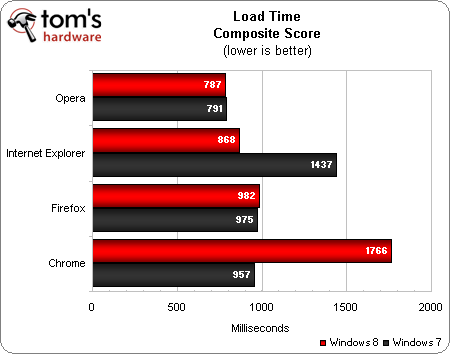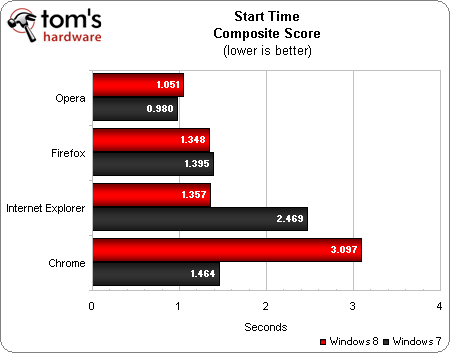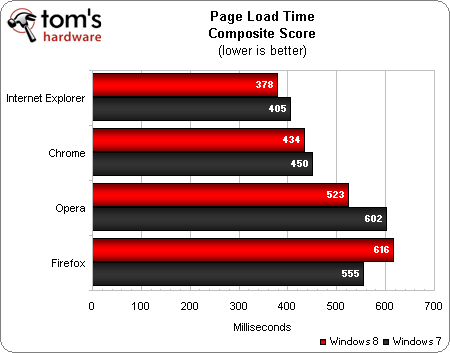Which Web Browser Is Best Under Windows 8?
Welcome to our first-ever Web Browser Grand Prix on Windows 8! Will Chrome remain the reigning Windows champion? Is Internet Explorer 10 going to smash the competition like its predecessor? Does Opera 12.10 finally deliver on what version 12 promised?
Load Times
Load Time Composite Score
Our load time composite score is the average of the start time and page load time results. All test pages for the start and page load time tests are saved and hosted on our local Web server. The test pages include a page on BBQ brisket from About.com, the Computer Parts & Components category on Amazon, a random popular question on Ask.com, the "free" section for Los Angeles on craigslist, my LinkedIn profile, the Wikipedia entry for "Tom's Hardware", and the Yahoo! homepage.
Opera takes the lead in the combined load time composite on both versions of Windows. This is no doubt thanks to its superior start times. IE10 places second on Windows 8, with third-place finisher Firefox closely in tow. Chrome tanks this test in Windows 8 due to its unusually high start times. In Windows 7, Chrome manages to place second, right behind Opera and ahead of Firefox, with IE9 in a distant last-place finish.
Start Time
Start times are measured both cold (after a fresh reboot) and hot (closed, and then reopened in the same session) with a single homepage as well as a home tab group of eight pages. The Yahoo! homepage serves as the test page in our single-tab start time tests. These tests are run cached; all test pages are pre-loaded in the browsers before testing. Each start time result is an average of three iterations, and the start time composite is a geometric mean of all four tests.
Opera again takes the lead in start time on both platforms. Firefox comes in second on both OSes, with IE10 taking third place for Windows 8 and Chrome for Windows 7. IE9 places dead last in Windows 7. No surprise there. But we can see that version 10 shaves an entire second off of Internet Explorer's start time. Chrome comes in a very distant last place in Windows 8, demonstrating oddly high start times across the board on Microsoft's new OS.
Drill Down
Get Tom's Hardware's best news and in-depth reviews, straight to your inbox.
The charts below contain the individual results of the single- and eight-tab, cold and hot start time tests.




Chrome 23 exhibits major issues with start times on Windows 8, which we don't see under Windows 7. With the exception of cold eight-tab start-ups (the longest test duration for any browser), the start time tests show Chrome nearly doubling its completion time in the newer version of Windows. We're not sure what could be causing this, as the other three browsers show marginally lower times in Windows 8 versus Windows 7.
Page Load Time
Page load times are taken both cached and uncached, and all the results are achieved by averaging five iterations.
Internet Explorer 10 is the big winner in the all-important page load times, although IE9 isn't exactly a slowpoke in this metric either. Both versions of Internet Explorer claim supremacy here, in fact. Chrome places second on both OSes, right behind IE. Opera takes third in Windows 8, followed by Firefox in fourth. The order of the last two finishers reverses on Windows 7.
Drill Down
The charts below contain the uncached and cached page load times of all eight individual test pages for each browser in Windows 8 and Windows 7.
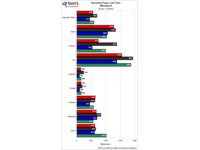
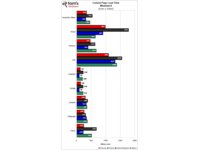
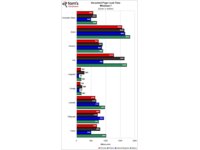
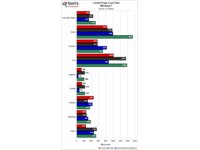
The page load times are pretty even with this particular group of browsers, and none of them show any significant weaknesses compared to the others.
Current page: Load Times
Prev Page Test Setup And Benchmark Suite Next Page HTML5 And CSS Performance-
mayankleoboy1 1. Did you ensure that Opera has Hardware acceleration and WebGL enabled in about:config ? AFAIk, Opera does not enable HWA by default.Reply
2. I find the over-reliance on "Internet Explorer Test drive" benchmarks disturbing. Most use code that is inefficient and not used anywhere else on the web, making it quite theoretical.
3. +1 for using Google Octane benchmark. Both google and mozilla agree that this is a good real-world benchmark.
4. Addition of the "Maze solver" benchmark is disappointing.
5. Why remove the subjective smoothness ? 95% of the time, subjective smoothness is what lures a person to use a specific browser. People use a browser, not run benchmarks on it all day. Subjectively, no browser can beat Google Chrome. Then comes Opera , Firefox and far lastly, IE10.
-
mayankleoboy1 Any technical reason why browser performs generally better in Win8 ? Even the 'WHQL' drivers from Nvidia and AMD arent quite mature for Win8.Reply
Games and applications did not show any improvement in Win8 over Win7. -
adamovera mayankleoboy11. Did you ensure that Opera has Hardware acceleration and WebGL enabled in about:config ? AFAIk, Opera does not enable HWA by default.2. I find the over-reliance on "Internet Explorer Test drive" benchmarks disturbing. Most use code that is inefficient and not used anywhere else on the web, making it quite theoretical.3. +1 for using Google Octane benchmark. Both google and mozilla agree that this is a good real-world benchmark.4. Addition of the "Maze solver" benchmark is disappointing.5. Why remove the subjective smoothness ? 95% of the time, subjective smoothness is what lures a person to use a specific browser. People use a browser, not run benchmarks on it all day. Subjectively, no browser can beat Google Chrome. Then comes Opera , Firefox and far lastly, IE10.1) We use fresh installs at default settings; Opera does not enable HWA by default.Reply
2) The only IETestDrive tests we use are Psychedelic Browsing and Maze Solver, and IE regularly loses to competitors on both.
3) Octane was not used because it had issues with IE9 and Opera 12.10.
4) We definitely need a new CSS test, but the only other options are outdated or on IETestDrive - unfortunately, Kaizoumark doesn't work with IE10.
5) It's really difficult to see that kind of stuff on a modern test system, but I will say that Chrome and IE10 are about equal in that department, with Firefox and Opera noticeably more choppy right at the beginning of the 40-tab load. -
adamovera mayankleoboy1Any technical reason why browser performs generally better in Win8 ? Even the 'WHQL' drivers from Nvidia and AMD arent quite mature for Win8.Games and applications did not show any improvement in Win8 over Win7.Not sure, the Nvidia drivers used were the same version on both OSes.Reply -
Reply
And we're also passing the torch from Windows 7 to Windows 8.
We are going to miss you on Web Browser Grand Prix, Windows 7 -
mayankleoboy1 Reply10447137 said:1) We use fresh installs at default settings; Opera does not enable HWA by default.
2) The only IETestDrive tests we use are Psychedelic Browsing and Maze Solver, and IE regularly loses to competitors on both.
3) Octane was not used because it had issues with IE9 and Opera 12.10.
4) We definitely need a new CSS test, but the only other options are outdated or on IETestDrive - unfortunately, Kaizoumark doesn't work with IE10.
5) It's really difficult to see that kind of stuff on a modern test system, but I will say that Chrome and IE10 are about equal in that department, with Firefox and Opera noticeably more choppy right at the beginning of the 40-tab load.
1. IMHO, enabling these settings would have made Opera more competitive and this article fairer.
3. Whoops, misread that. But this is a good benchmark. Robohornet and robohornet pro are complete jokes.
4. Just exclude the maze solver. Its bad coding, as any web developer can tell you.
5. Thats exactly what i'm saying. This needs to be factored in the overall score. You want the browser UI to always remain smooth. UI choppiness is unacceptable and sloppy coding. We are not living in the 90's anymore.
The one thing i dislike in Chrome is the memory bloat when opening many tabs. In the 40tab test, FF uses 600 MB. Chrome uses 1600MB :O. That is probably an iverhead of using separate processes for each tab. That is excellent for smoothness and UI fluidity. But shameful for memory consumption. I guess devs need to find a middle path.
-
mayankleoboy1 Both 'mozilla kraken' and 'Google sunspider' benchmarks need to be retired . They are old, and all the major browsers have optimizations to score better on them.Reply
Plus, they heavily test features that are not used anywhere else on teh web.
Example : Sunspider makes a billion manipulations to the the "date" variable. Mozilla did not have any optimization for this. So it scored poorly on Sunspider. After numerous 'review sites' started using sunspider to test FF Vs Chrome, mozilla developers had to reluctantly add the same optimisation (which is basically a separate buffer to store the date). Of course, nowhere on the web is the date variable used in this manner. So its optimization for an artificial test. -
wilem_WAR246810 "The King Is Dead, Long Live The King!" am I the only one who thought of Megadeth?Reply -
deepblue08 mayankleoboy1Any technical reason why browser performs generally better in Win8 ? Even the 'WHQL' drivers from Nvidia and AMD arent quite mature for Win8.Games and applications did not show any improvement in Win8 over Win7.Reply
As far as I heard there are significant under-the-hood improvements in Win8, in terms of memory efficiency and multi-core usage. -
epileptic Is it Opera x64 or x86? I remember having tested Opera 12 and the startup was very slow. I'm still using 11.64 atm. The only thing keeping me from moving to Firefox is how sluggish the UI feels... I'd also have to find a new mail client. :/Reply
